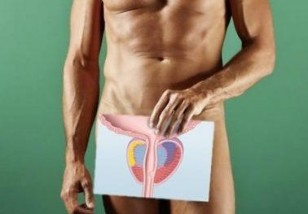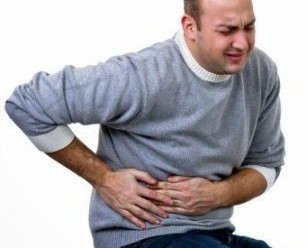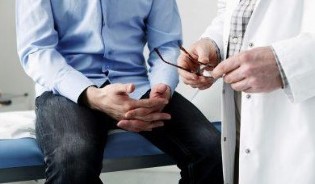The inflammation of the prostate gland is a serious disease that can lead to serious consequences if not treated. The prostate is located below the bladder.
When she is fired, and then increases greatly in size, ignoring the neck of the bladder and obstructing the outflow of urine. Therefore, when the first symptoms and manifestations, it is necessary to immediately consult a specialist to locate and start the treatment of prostatitis.

The main symptoms are: how is it manifested prostatitis?
Previously, it was thought that the disease in adults and men, but in the current conditions of life (environment, quality of the food, the fashion, the attitude, careless young people to their health, the constant circulation of cars, etc) inflammation of the prostate significantly "younger".
The incidence of young people below the age of 18 years is 5%, between the ages of 18 and 30 years old – 45%, from 30 to 50 years – 20%, more than 50 years – 30%. This suggests that follow the the male health, and listen to the symptoms, is necessary for the young years.
There are several types of prostatitis, the form of the development (chronic, acute) and the type of inflammation (bacterial, stagnant, purulent, infectious, calculous). The symptomatology of the disease is different, depending on the type of inflammation of the prostate gland in men.
Symptoms of prostatitis:
- bad health conditions (weakness, chills, fever). A person can start to throw in the heat, in the cold. The most common symptoms are reminiscent of the event of SARS or the flu;
- the strong increase in the temperature of the body of the school (37,5-38 degrees celsius) and above;
- points of force of cutting, stabbing pains in the perineum (the area of the groin, anus, etc.);
- pain in the lower back, hips, sacrificed in the feet, the knees, the feet or the leg muscles;
- the acute pain, which appears in defecation and when straining;
- problems with urination (too short / frequent urination, painful or difficult urination). Retention of urine long period of time (over 12 hours);
- the deterioration of sexual function (weak or total lack of erection, premature ejaculation, problems with conception);
- selection of the genitals (more heavy, and the execution of the cases of prostatitis).
The symptoms of chronic prostatitis:
- problems with urination (difficulty urinating, pain, insufficient discharge of urine, feeling of incomplete emptying of the bladder, etc);
- unpleasant annoying and pain sensations in the perineum, between the legs, on the groin, into the anus. The pain syndrome is not pronounced;
- the groin can sometimes experience a sharp pain or a sensation of strong burning sensation, rising to the horse;
- general malaise in the course of the period (drowsiness, apathy, depression, constant fatigue, muscle weakness, etc);
- nervousness, irritability;
- a slight increase in body temperature. Sometimes for a long time can be low-grade fever;
- the reduction of sexual function (erection problems, decrease in or absence of ejaculation, decreased libido, infertility, etc).

Chronic prostatitis suggests periods of remission and relapse. In a period of relapse in the chronic form, the symptoms may develop in acute form the symptoms of the disease.
The symptoms of bacterial form:
- signs of an inflammatory process (fever, fever, increase in temperature, generalized weakness, pain syndrome in the muscles and in the bones);
- signs of local inflammation of the prostate gland (syndrome of pain in the perineum, groin, anus);
- problematic urination;
- the change of consistency, color and odor of the liquids (urine, secret of the prostate gland, semen, blood).
The symptoms of calculous form:
- the weak and moderate pain of the lumbar, sacral department, the perineum, the anus;
- the pain and burning sensation in the groin, the groin;
- pain greatly amplified after sexual intercourse and during active movement;
- problems with urination, feeling of fullness of the bladder;
- decreased libido, problems with ejaculation and erection (up to erectile dysfunction);
- in advanced cases the sperm may appear to be a drop of blood (it becomes clear, pink or bright red).
The symptoms of insufficiency form:
- persistent unpleasant sensations in the groin area, the perineum and the anus;
- periodic pain in the perineal area;
- difficult urination, feeling of not until the end of inanis bladder;
- the constant increase of the temperature in the low-grade indicators;
- events in the general inflammatory process in the body (increase of the erythrocyte sedimentation rate in the blood, malaise, drowsiness, fatigue, headache, weakness, muscle pain, etc);
- the problems in the sexual sphere (ejaculation and weak erection, infertility);
- illegal state, depression, apathy.
The symptoms of infectious diseases the form:
- signs of inflammation in the body (increase in the value of the rate of erythrocyte sedimentation in the blood of men, muscle pain, increased body temperature);
- sore, sore back, groin and perineal area;
- pain during defecation;
- strong pain in the groin and perineal area;
- problems with urination (difficulty, frequent urination, lack of stimuli, etc).
The symptoms purulent form:
- strong increase in body temperature (above 38, 5 degrees);
- signs of inflammation in the body (high value of ESR, muscle aches, fever, chills, etc);
- pronounced pain syndrome in the groin, the perineum and the anus;
- strong perineal pain;
- difficulty urinating, painful urination;
- purulent discharge from the genitals.
What are the first signs of men?
When you start to inflammation of the prostate gland in men, can occur only a part of the symptoms of the disease. The signs of incipient inflammation of the prostate, which is necessary to pay particular attention to:

- the discomfort in the perineum;
- periodic moderate pain in the groin and perineal area;
- pulling the unpleasant sensations in the anus and in the bowel during defecation (in the absence of hemorrhoids);
- the long malaise, which is not connected to COLDS, sore throat, flu, and other common cold;
- decreased libido, crash during ejaculation and the erection (periodic his / her absence);
- the reduction in the quality of orgasm;
- unpleasant sensations in the urethra, and the groin during the sex or after the sexual intercourse;
- the change of consistency, color and smell of the semen;
- the increase of the temperature of the body.
Manifested signs of acute prostatitis:
- the increase of the temperature to 37,5-40 degrees for no apparent reason (not the cold, not the flu, sore throat);
- the frequency of urination increases of 3-4 times and is accompanied by severe pain. The urine comes out slowly and with a light pressure;
- burning sensation in the groin, the groin, and during defecation. Pain in the intestine during the defecation;
- with pyorrhea from the colon or the urethra (in the case of a serious and purulent form of the disease).
Shown signs of chronic inflammation of the prostate gland:
- burning sensation in the groin and perineum. Burning sensation in the genitals (especially during urination and sex);
- purulent secretion from the urethra after urination and during straining (active movements or defecation). Purulent discharge from the rectum;
- nervousness, depression, irritability;
- tiredness without apparent reason, drowsiness.
Syndrome painful inflammation of the prostate
Almost always when the inflammation of the prostate, the man can know the causes of the syndrome of pain for his character. Medium pulling, pain, or acute pain appear in the crotch and groin. In the form of acute recurrent or chronic form of the disease the pain is characterised by both acute and sudden, the pain is strong, cutting and pulling. In the chronic form of the disease pain, leads the periodic wave nature. Also, the pain can be moderate, but constant. Inflamed the prostate presses on the urethra, the neck of the bladder and the ureters. For these channels the urine from the bladder, which may appear as pain during urination. Also pain during urination can be a symptom of infection of the bladder or the genitourinary system diseases sexually transmitted diseases sexually transmitted diseases).
Accompanying the pain may have a completely different cause. As well as the presence of more accompanying prostatitis pain can be a inflammation of the prostate, and a number of other illnesses.
Other causes of pain that accompanies:
- abdominal pain are the symptom of many other diseases. A striking example is appendicitis, acute intoxication, intestinal infection, or interfaith.
- Loin can become ill due to hernias, arthrosis, contractures and nerve endings, osteoporosis, multiple sclerosis and other diseases of the spinal column.
- pain in the anus may be due to hemorrhoids, fissures, lesions, a long sitting on an uncomfortable surface, solid, and of various tumors (benign or malignant).
- Painful syndrome of the vertebral column sacral is more serious. This is often problems with the bones, the vertebrae and the discs (back pain, osteoporosis, offset, crushing, etc.).

Sometimes the same pain in the derriere mean problems with the other internal organs (kidneys, intestines, the bladder, and the ureters), gynecological diseases, thrombophlebitis, pelvic inflammation.
- Soreness of the legs can mean the manifestation of flat feet, thrombophlebitis, atherosclerosis, varicose veins, arthritis, osteoporosis, inflammation of the sciatic nerve and even diabetes. The leg pain can be a lot of different reasons.
The most common is the tiredness of the legs and of the muscles from prolonged physical activity.
As a specialist we can take care of the disease?
Diagnose the patient inflammation of the prostate can only qualified doctor – the urologist. Collects history and performs a physical examination of the patient. Then directs a man in the analyses (PSA-antigen – binding protein to identify the prostatitis) and ULTRASOUND of the pelvic organs.
The patient compulsorily rent common blood tests and urinalysis. According to the results of all analyses performed and a urologist can accurately determine the diagnosis and the form of inflammation of the prostate. Only after these procedures, the doctor may prescribe the patient a course of treatment, including medications, antibiotics, and other medicines you take usually at home.
The man in 95% of cases, knows exactly what kind of diagnosis will make him the doctor-the urologist, because the pain when the inflammation of the prostate very peculiar. Must always listen to your body, keep track of all the changes that occur with the body. Only thus will a man for many years to preserve the health of men. Launched prostatitis risk not only a disorder of urination, but also problems with libido, ejaculation, erection, which can ultimately lead to infertility.
























